- Home
- Fergus Hume
The Mystery of a Hansom Cab Page 12
The Mystery of a Hansom Cab Read online
Page 12
‘Find out at the club if any letter was waiting for him on that night,’ said Calton, as the cab stopped at the door of the Melbourne Club. ‘Here we are,’ and with a hasty word to Madge, he ran up the steps.
He went to the office of the club to find out if any letters had been waiting for Fitzgerald, and found there a waiter with whom he was pretty well acquainted.
‘Look here, Brown,’ said the lawyer, ‘do you remember, on that Thursday night, when the hansom cab murder took place, if any letters were waiting here for Mr Fitzgerald?’
‘Well, really, sir,’ hesitated Brown, ‘it’s so long ago that I almost forget.’
Calton gave him a sovereign.
‘Oh! it’s not that, Mr Calton,’ said the waiter, pocketing the coin nevertheless. ‘But I really do forget.’
‘Try and remember,’ said Calton, shortly.
Brown made a tremendous effort of memory, and at last gave a satisfactory answer.
‘No sir, there were none!’
‘Are you sure?’ said Calton, feeling a thrill of disappointment.
‘Quite sure, sir,’ replied the other confidently. ‘I went to the letter rack several times that night, and I am sure there was none for Mr Fitzgerald.’
‘Ah! I thought as much,’ said Calton, heaving a sigh.
‘Stop,’ said Brown, as though struck with a sudden idea, ‘though there was no letter came by post, sir, there was one brought to him on that night.’
‘Ah!’ said Calton, turning sharply round. ‘At what time?’
‘Just before twelve o’clock, sir.’
‘Who brought it?’
‘A young woman, sir,’ said Brown, in a tone of disgust. ‘A bold thing, beggin’ your pardon, sir; and no better than she should be. She bounced in at the door as bold as brass, and sings out, “Is he in?” “Get out,” I says, “or I’ll call the perlice.” “Oh, no you won’t,” says she, “you’ll give him that,” and she shoves a letter into my hands. “Who’s him?” I asks. “I dunno,” she answers, “it’s written there, and I can’t read; give it him at once.” And then she clears out before I could stop her.’
‘And the letter was for Mr Fitzgerald?’
‘Yes, sir! and a precious dirty letter it was, too.’
‘You gave it to him, of course?’
‘I did, sir! he was playing cards, and he put it in his pocket, after having looked at the outside of it, and went on with his game.’
‘Didn’t he open it?’
‘Not then, sir! but he did later on, about a quarter to one o’clock. I was in the room, and he opens it and reads it, then he says to himself “What damned impertinence,” and puts it into his pocket.’
‘Was he disturbed?’
‘Well, sir! he looked angry like, and put his coat and hat on, and walked out about five minutes to one.’
‘Ah! and he met Whyte at one,’ muttered Calton. ‘There’s no doubt of it—the letter was an appointment, and he was going to keep it. What kind of a letter was it?’ he asked.
‘Very dirty, sir! in a square envelope, but the paper was good, and so was the writing.’
‘That will do,’ said Calton, ‘I am much obliged to you,’ and he hurried down to where Madge awaited him in the cab.
‘You were right,’ he said to her, when the cab was once more in motion. ‘He got a letter on that night, and went to keep his appointment at the time he met Whyte.’
‘I knew it,’ cried Madge, with delight. ‘You see, we will find it in his lodgings.’
‘I hope so,’ answered Calton, ‘but we must not be too sanguine—he may have destroyed it.’
‘No, he has not,’ she replied. ‘I am convinced it is there.’
‘Well,’ answered Calton, looking at her, ‘I won’t contradict you, for your feminine instincts have done more to discover the truth than my reasonings, but that is often the case with women—they jump in the dark, where a man would hesitate, and in nine cases out of ten land safely.’
‘Alas! for the tenth,’ said Miss Frettlby. ‘She has to be the one exception to prove the rule.’
She had in a great measure recovered her spirits, and seemed confident that she would save her lover. But Mr Calton saw that her nerves were strung up to the highest pitch, and that it was only her strong will that kept her from breaking down altogether.
‘By Jove,’ he muttered, in an admiring tone, as he watched her. ‘She’s a plucky girl, and Fitzgerald is a lucky man to have a woman like that in love with him.’
They soon arrived at Brian’s lodgings, and the door was opened by Mrs Sampson, who looked very disconsolate indeed. The poor cricket had been blaming herself severely for the information she had given to the false insurance agent, and the floods of tears, which she had wept, had apparently had an effect on her physical condition, for she crackled less loudly than usual, though her voice was as shrill as ever.
‘That sich a thing should ’ave ’appened to ’im,’ she wailed, in her thin, high voice. ‘An’ me that proud of ’im, not ’avin’ any family of my own, except one as died, an’ went up to ’eaving arter ’is father, which I ’opes as they both are now angels, an’ friendly, as ’is nature ’ad not developed in this valley of the shadder to determine ’is feelin’s towards ’is father when ’e died, bein’ carried off by a chill, caused by the change from ’ot to cold, the weather bein’ that contrary.’
They had arrived in Brian’s sitting-room by this time, and Madge sank into a chair, while Calton, anxious to begin the search, hinted to Mrs Sampson that she could go.
‘I’m departin’ sir,’ piped the cricket, with a sad shake of her head, as she opened the door, ‘knowin’ as I do as ’e’s as innocent as an unborn babe, an’ to think of me ’avin’ told that ’orrid pusson who ’ad no regard for the truth all about ’im as is now in a cold cell, not as what the weather ain’t warm, an’ ’e won’t want a fire as long as they allows ’im blankets.’
‘What did you tell him?’ asked Calton, sharply.
‘Ah! you may well say that,’ lamented Mrs Sampson, rolling her dingy handkerchief into a ball and dabbing at her red rimmed eyes, which had quite a bacchanalian look about them, though, poor soul, it was owing to grief, and not to liquor. ‘’Avin’ bin beguiled by that serping in light clothes as wanted to know if ’e allays come ’ome afore twelve, which I said ’e was in the ’abit of doin’, tho’, to be sure, ’e did sometimes use ’is latch key.’
‘The night of the murder for instance?’
‘Oh! don’t say that, sir,’ said Mrs Sampson, with a terrified crackle. ‘Me bein’ weak an’ ailin’, tho’ comin’ of a strong family as allays lived to a good age, thro’ bein’ in the ’abit of wearin’ flannels, which my mother’s father thought better nor a-spilin’ the inside with chemistry.’
‘Clever man, that detective,’ murmured Calton to himself. ‘He got out of her by strategy what he never would have done by force. It’s a strong piece of evidence against Fitzgerald, but it does not matter much if he can prove an alibi. You’ll likely be called as a witness for the prosecution,’ he said aloud.
‘Me, sir!’ squeaked Mrs Sampson, trembling violently, and thereby producing a subdued rustle, as of wind in the trees. ‘’As I’ve never bin in the Court, ’cept, the time as father tooked me for a treat, to ’ear a murder, which there’s no denyin’ is as good as a play. ’E bein’ ’ung, ’avin’ ’it ’is wife over the ’ead with the poker when she weren’t lookin’, and a-berryin’ ’er corpse in a back garding without even a stone to mark the place, let alone a line from the psalms and a remuneration of ’er virtues.’
‘Well! well!’ said Calton, rather impatiently, as he opened the door for her. ‘Leave us for a short time, there’s a good soul, Miss Frettlby and I want to have a rest, and we will ring for you when we are going.’
‘Thank you, sir,’ said the lachrymose landlady, ‘an’ I ’opes they won’t ’ang ’im, which is sich a choky way of dyin’, but in life we are in death,’ she went on,
rather incoherently. ‘As is well known to them as ’as diseases, and may be corpsed at any minute, and as—’
Here, Calton, unable to restrain his impatience any longer, shut the door, and they heard Mrs Sampson’s shrill voice and subdued cracklings die away in the distance.
‘Now then,’ he said, ‘now that we have got rid of that woman and her tongue, where are we to begin?’
‘The desk,’ replied Madge, going over to it. ‘It’s the most likely place.’
‘Don’t think so,’ said Calton, shaking his head. ‘If, as you say, Fitzgerald is a careless man, he would not have troubled to put it there. However, perhaps we’d better look.’
The desk was very untidy—‘Just like Brian,’ as Madge remarked—full of paid and unpaid bills, old letters, playbills, ball programmes, and several withered flowers. ‘Reminiscences of former flirtations,’ said Calton, with a laugh, pointing to these.
‘I should not wonder,’ retorted Miss Frettlby, coolly. ‘Brian always was in love with someone or another. But you know what Lytton says, “There are many counterfeits, but only one Eros,” so I can afford to forget these things.’
The letter, however, was not to be found in the desk, nor was it in the sitting-room; they tried the bedroom, but with no better result; so Madge was nearly giving up the search in despair, when suddenly Calton’s eye fell on the wastepaper basket, which, by some unaccountable reason, they had overlooked in their search. The basket was half full, in fact more than half, and, on looking at it, a sudden thought struck the lawyer. He rang the bell, and, presently, Mrs Sampson made her appearance.
‘How long has that wastepaper basket been standing like that?’ he asked, pointing to it.
‘It bein’ the only fault I ’ad to find with ’im,’ said Mrs Sampson, ‘’e bein’ that untidy that ’e never let me clean it out until ’e told me pussonlly. ’E said as ’ow ’e throwed things into it as ’e might ’ave to look up again; an’ I ’aven’t touched it for more nor six weeks, ’opin’ you won’t think me a bad ’ousekeeper, it bein’ ’is own wish, bein’ fond of litter an’ sich like.’
‘Six weeks,’ repeated Calton, with a look at Madge. ‘Ah, and he got the letter four weeks ago, depend upon it, we shall find it there.’
Madge gave a cry, and, falling on her knees, emptied the basket out on the floor, and both she and Calton were soon as busy among the fragments of paper, as though they were rag pickers.
‘’Opin’ they ain’t orf their ’eads,’ murmured Mrs Sampson, as she went to the door, ‘but it looks like it, they bein’—’
Suddenly a cry broke from Madge, as she drew out of the mass of paper a half-burnt letter, written on thick and creamy-looking paper.
‘At last,’ she cried, rising off her knees, and smoothing it out, ‘I knew he had not destroyed it.’
‘Pretty nearly, however,’ said Calton, as his eye glanced rapidly over it, ‘it’s almost useless as it is, seeing there’s no name to it.’
He took it over to the window and spread it out on the table. It was dirty, and half burnt, but still it was a clue.
The following is a facsimile of the letter:—
‘There is not much to be gained from that I’m afraid,’ said Madge, sadly. ‘It shows that he had an appointment—but where?’
Calton did not answer, but, leaning his head on his hands, stared hard at the paper. At last, he jumped up with a cry—
‘I have it,’ he said, in an excited tone. ‘Look at that paper, see how creamy and white it is, and, above all, look at the printing in the corner, “—OT VILLA, TOORAK.”’
‘Then he went down to Toorak?’
‘In an hour, and back again—hardly.’
‘Then it was not written from Toorak?’
‘No, it was written in one of the Melbourne back slums.’
‘How do you know?’
‘Look at the girl who brought it,’ said Calton, quickly. ‘A disreputable woman, one far more likely to come from the back slums than Toorak. As to the paper, three months ago there was a robbery at Toorak, and this is some of the paper that was stolen by the thieves.’
Madge said nothing, but her sparkling eyes and nervous trembling of the hands showed her excitement.
‘I will see a detective this evening,’ said Calton, exultingly, ‘find out where this letter came from, and go and see who wrote it. We’ll save him yet,’ he said, placing the precious letter carefully in his pocketbook.
‘You think that you will be able to find the woman who wrote that?’
‘Hum,’ said the lawyer, looking thoughtful, ‘she may be dead, as the letter says she is in a dying condition. However, if I can find the woman who delivered the letter at the club, and who waited for Fitzgerald at the corner of Bourke and Russell streets, that will be sufficient. All I want to prove is that he was not in the hansom cab with Whyte.’
‘And you think you can do that?’
‘Depends upon this letter,’ said Calton, enigmatically tapping his pocketbook with his finger. ‘I’ll tell you tomorrow.’
Shortly afterwards they left the house, and when Calton put Madge safely into the St Kilda train, her heart felt lighter than it had done since Fitzgerald’s arrest.
CHAPTER FOURTEEN
ANOTHER RICHMOND IN THE FIELD
There is an old adage that ‘like draws to like,’ and the antithesis of this would probably be that unlike keeps as far away from unlike as it possibly can. Sometimes, however, Fate, who seems to take a malignant pleasure in worrying humanity, throws them together, and the result is an eternal conflict between the uncongenial elements.
Mr Gorby was a very clever detective, and got on well with everyone with the exception of Kilsip; the latter on the other hand was equally as clever in his own way, and was a favourite with everyone but Gorby. One was fire and the other water, so when they came together there was sure to be trouble. Kilsip, in his outward appearance, was quite different from Gorby, being tall and slender, whereas the other was short and stout. Kilsip was dark and clever-looking, Gorby was not, his face wearing a complacent and satisfied smile, which one would not expect to find on the features of a man who was looked upon as such a clever detective. But it was this very smile that was Mr Gorby’s greatest aid in getting information, as people were more ready to tell a kindly and apparently simple man like him all they knew, than a sharp-looking fellow like Kilsip, whose ears and eyes seemed always on the alert. The hearts of all went forth to Gorby’s sweet smile and insinuating manner, but when Kilsip appeared everyone shut up like an oyster, and each retired promptly into his or her shell like an alarmed snail.
The face is not always the index of the mind, in spite of the saying to that effect, and the student of Lavater is not invariably right in his readings of character by means of the features. The only thing sharp about Mr Gorby’s appearance was his keen little grey eyes, which he knew how to use so well, and a glance from which startled any unsuspecting person, who had been beguiled by the complacent smile and sweet manner. Kilsip, on the contrary, had one of those hawk-like faces, which always seem seeking for prey, with brilliant black eyes, hooked nose, and small thin-lipped mouth. His complexion was quite colourless, and his hair jet black, so that with his tall, slender figure, and snake-like movements, he was hardly a pleasant object to look upon. He also possessed in a great measure, the craft and cunning of the snake, and as long as he conducted his movements in secret, was successful, but once he appeared personally on the scene his strange looks seemed to warn people that they might be too communicative.
So taking things all round, although Kilsip was the cleverer of the two, yet Gorby, owing to his physical advantages, was the more successful. They each had their followers and admirers, but both men cordially detested one another, seldom meeting without a quarrel. When Gorby, therefore, had the hansom cab murder case put into his hands, the soul of Kilsip was smitten with envy, and when Fitzgerald was arrested, and all the evidence collected by Gorby seemed to point so conclusivel
y to his guilt, Kilsip writhed in secret over the triumph of his enemy. Though he would only have been too glad to have said Gorby had got a hold of the wrong man, yet the evidence was so conclusive that such a thought had never entered his head until he received a note from Mr Calton, asking him to call at his office that evening at eight o’clock, with reference to the hansom cab murder. Kilsip knew that Calton was counsel for the prisoner, and instantly guessed that a clue had been discovered, which he was wanted to follow up, and which might prove the prisoner’s innocence. Full of this idea he had determined to devote himself, heart and soul, to whatever Calton wanted him to do, and if he only could prove Gorby wrong, what a triumph it would be. He was so pleased with the possibility of such a thing that accidentally meeting his rival, he asked him to have a glass. As such a thing had not occurred before, Gorby was somewhat suspicious of such sudden hospitality, but as he flattered himself that he was more than a match for Kilsip, both mentally and physically, he accepted the invitation.
‘Ah!’ said Kilsip, in his soft low voice, rubbing his lean, white hands together, as they sat over their drinks, ‘you are a lucky man to have laid your hands on that hansom cab murderer so quickly.’
‘Yes; I flatter myself I did manage it pretty well,’ said Gorby, lighting his pipe. ‘I had no idea that it would be so simple—though, mind you, it required a lot of thought before I got a proper start.’
‘I suppose you’re pretty sure he’s the man you want,’ pursued Kilsip softly, with a brilliant flash of his black eyes.
‘Pretty sure, indeed!’ retorted Mr Gorby scornfully, ‘there ain’t no pretty sure about it. I’d take my Bible oath he’s the man. He and Whyte hated one another. He says to Whyte, “I’ll kill you if I’ve got to do it in the open street.” He meets Whyte drunk, a fact which he acknowledges himself; he clears out, and the cabman swears he comes back, then he gets into the cab with a living man, and when he comes out leaves a dead one; he drives to East Melbourne and gets into the house at a time which his landlady can prove—just the time that a cab would take to drive from the grammar school on the St Kilda Road. If you ain’t a fool, Kilsip, you’ll see as there’s no doubt about it.’

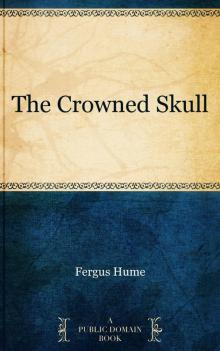 The Crowned Skull
The Crowned Skull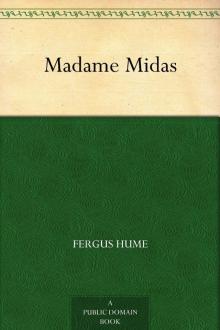 Madame Midas
Madame Midas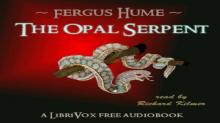 The Opal Serpent
The Opal Serpent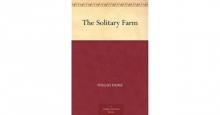 The Solitary Farm
The Solitary Farm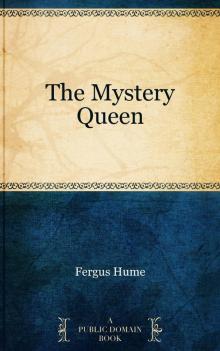 The Mystery Queen
The Mystery Queen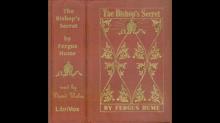 The Bishop's Secret
The Bishop's Secret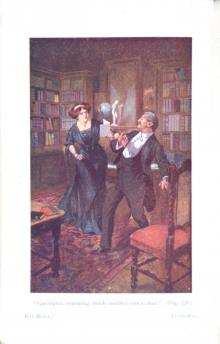 Red Money
Red Money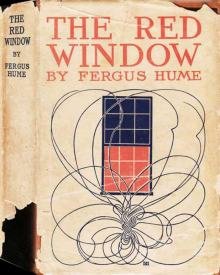 The Red Window
The Red Window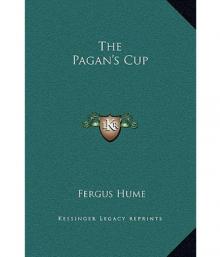 The Pagan's Cup
The Pagan's Cup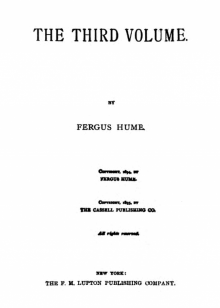 The Third Volume
The Third Volume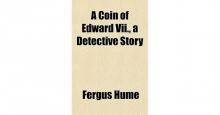 A Coin of Edward VII: A Detective Story
A Coin of Edward VII: A Detective Story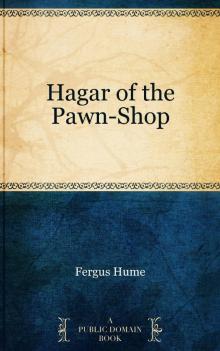 Hagar of the Pawn-Shop
Hagar of the Pawn-Shop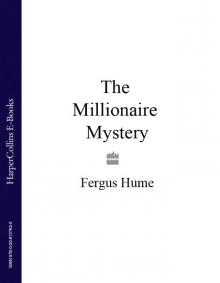 The Millionaire Mystery
The Millionaire Mystery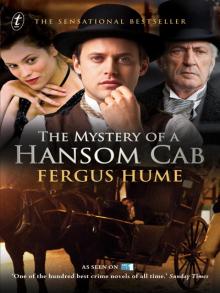 The Mystery of a Hansom Cab
The Mystery of a Hansom Cab